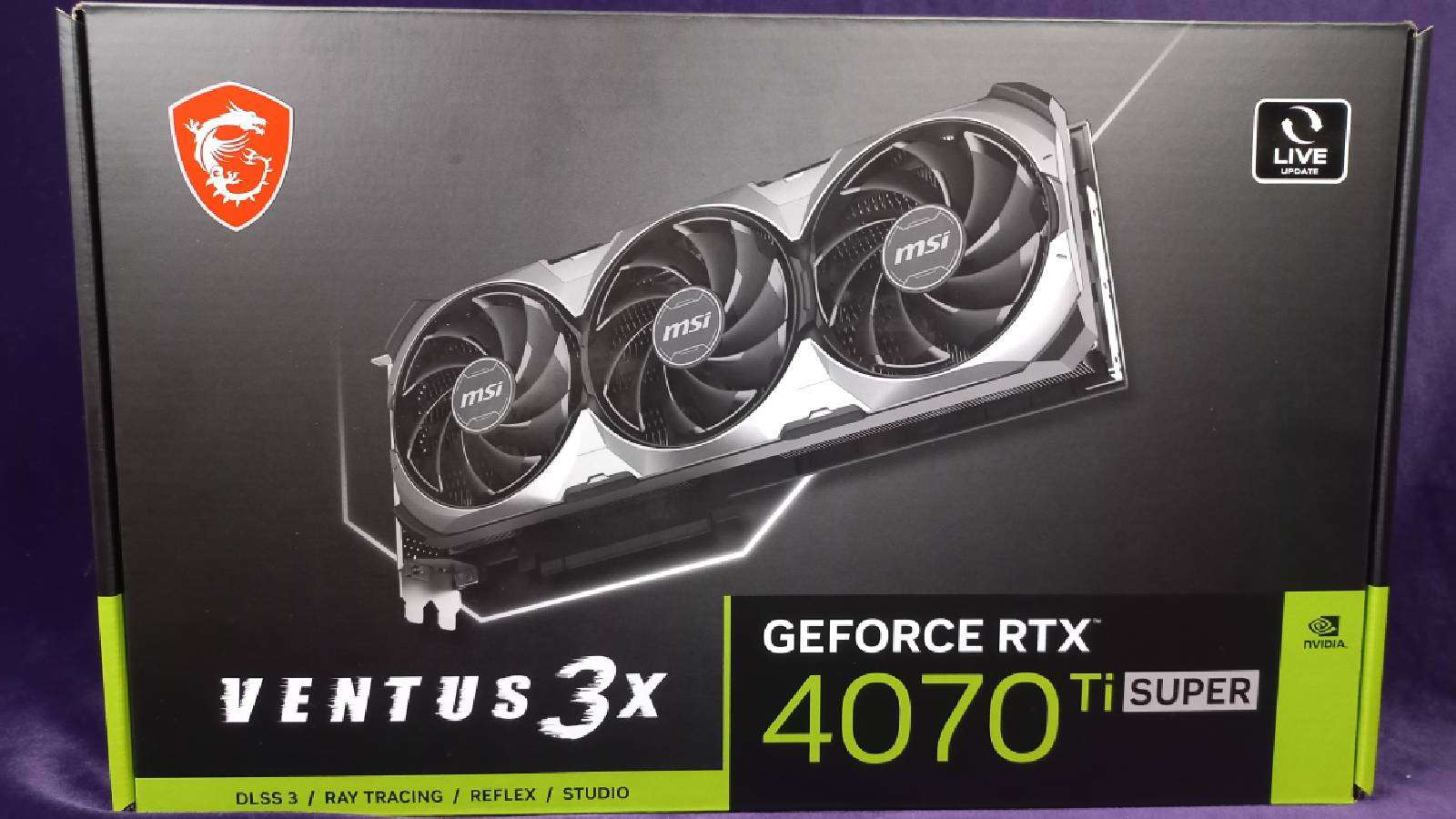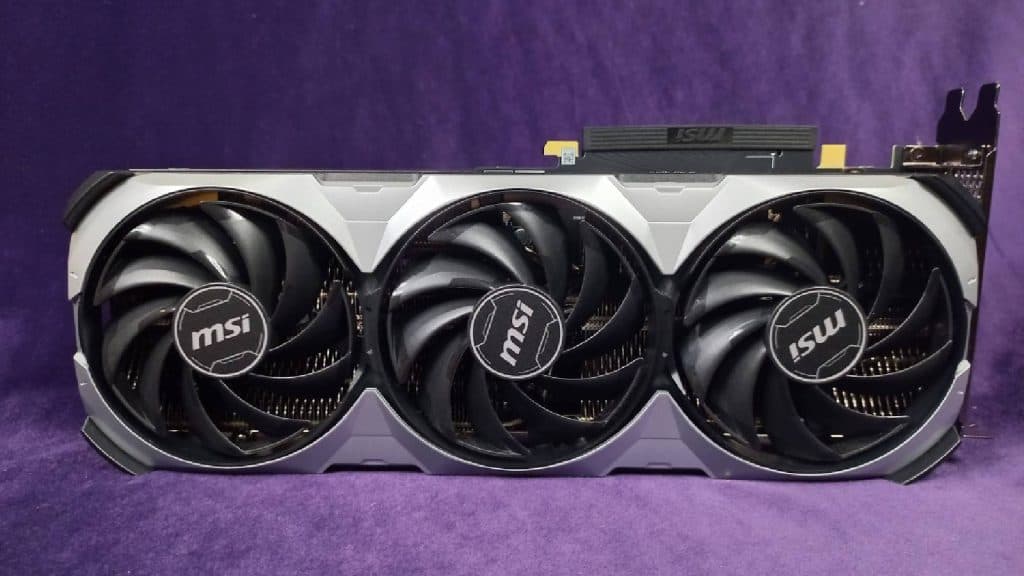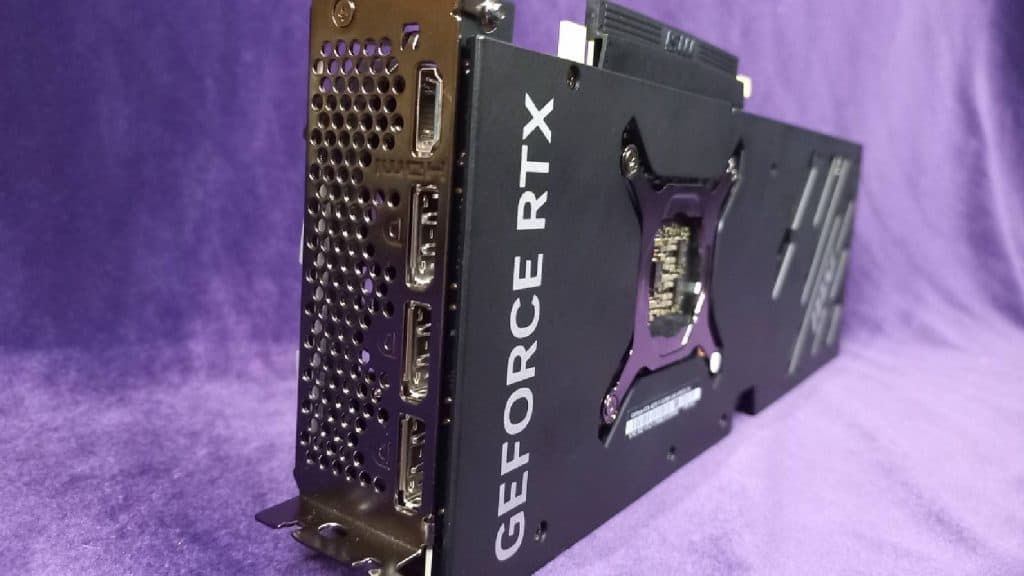MSI RTX 4070 Ti Super Ventus 3X review: A middling mid-gen refresh

The latest of Nvidia’s Super cards has been released, and it has undergone thorough testing to see how it stacks up against predecessors and rivals.
When news first leaked out regarding the Nvidia GeForce RTX 4070 Ti Super, many industry analysts were skeptical about its very existence. Its name didn’t fit Nvidia’s usual product naming scheme, as Ti and Super were not usually paired together on the same product.
However, the RTX 4070 Ti Super is indeed real and is aiming to boost the somewhat lackluster performance of the RTX 4070 Ti that it is replacing. It comes hot on the heels of the RTX 4070 Super, a GPU that got high marks from us for its excellent performance figures and value for money. Can the RTX 4070 Ti Super keep up the pace, or will it flounder behind its siblings?
Key Specs
| GPU | MSI GeForce RTX 4070 Ti SUPER 16G Ventus 3X |
| CUDA cores | 8448 |
| Boost Clock | 2610 MHz |
| Memory Clock | 10500 MHz |
| Memory Speed | 21 Gbps |
| Memory | 16 GB GDDR6X |
| Memory bus width | 256 bit |
| TGP | 285 W |
| Power input | 12-pin PCIe 12VHPWR (adapter included) |
| Size | Triple-slot |
| Display Outputs | 1 X HDMI 2.1, 3X DisplayPort 1.4a |
| Price | $799 |
Design
The version of the card we have for review is the MSI GeForce RTX 4070 Ti SUPER 16G Ventus 3X. It uses a triple fan layout, with a matte black fascia, and a copper baseplate with heat pipes for additional cooling. It looks decent but lacks flair. It doesn’t have the sleek industrial minimalism of the Founders Edition RTX 4070 Super, nor any other external features to attract admiration. It just does its job with little fuss.
The 4070 Ti Super is mostly a very quiet card, it ‘revs up’ during loading, then the fan noise cams back down and you can barely hear it. Like other modern RTX cards, it has a zero-RPM mode that stops the fans when the GPU is not being stressed.

Nvidia has made an effort to correct one of the main problems with the RTX 4070 Ti, as the Super version comes with 16GB of VRAM, up from 12GB of its predecessor. This provides the breathing room needed for 4K gaming that the vanilla version lacked.
The power requirements also remain the same, keeping at a reasonable 285 watts of the original card. That said, Nvidia is still suggesting users install a 750-watt power supply. The box comes with a power converter cable that converts eight-pin PCIe power connectors to the PCIe 12VHPWR connection needed by these cards. The cable is well-made but also substantial, taking up a fair amount of space all by itself, which could be an issue for those working on smaller cases.
Performance
MSI GeForce RTX 4070 Ti SUPER 16G Ventus 3X shipped with a problem with its VBIOS that meant the performance was not quite up to scratch. A new VBIOS was sent out, but it turns out that the second VBIOS also had some issues. This was extremely disappointing, as a refreshed version of an existing card, it shouldn’t be too much to expect that such issues had already been ironed out. It also doesn’t exactly reflect highly on MSI’s testing and quality control.
The RTX 4070 Ti Super can support both 1440p and 4K gaming, though is more geared towards the former. There is very little point in spending the extra cash on an RTX 4070 Ti Super only to use it for 1080p gaming, so that has been left out of our testing for this card.
To further push the capabilities of the card, DLSS 3 features will be tested on some titles to see how it performs under Ray Tracing workloads. Since few games currently support RT Overdrive, we have not included that option in our testing. Just note that the results in Cyberpunk 2077 may be lower than other cards, which predate the title’s Phantom Liberty update.
Test system
- CPU: Intel Core i5-13600K
- CPU cooler: Cooler Master PL360 Flux
- Motherboard: ASUS ROG Z790 Maximus Extreme
- RAM: ADATA XPG Lancer RGB 32GB DDR5-6000
- Storage: Adata Legend 600 1TB
- Case: Hyte Y60
- PSU: EVGA Supernova GT 1300
RTX 4070 Ti Super 4K gaming performance
| Game | RTX 4070 Ti Super | RTX 4070 Ti | RTX 4070 Super | RTX 4080 | Radeon 7800XT |
| Forza Horizon 5 (Ultra, RT & DLSS off) | 130 FPS | 123 FPS | 109 FPS | 137 FPS | 113 FPS |
| Cyberpunk 2077 (Ultra RT Ultra, DLSS Performance, Frame Generation) | 75 FPS | 86 FPS | 62 FPS | 108 FPS | 38 FPS |
| Cyberpunk 2077 (Ultra RT Ultra, DLSS off) | 23 FPS | 22 FPS | 17 FPS | 29 FPS | 12 FPS |
| Overwatch 2 (Ultra) | 301 FPS | 257 FPS | 186 FPS | 446 FPS | 172 FPS |
Starting with 4K benchmarks, the RTX 4070 Ti performs well, though similarly to its RTX 4070 Super stablemate, starts to struggle under the extreme demands of path-tracing. Even under those loads, it remains very playable and details like smoke and reflections look beautiful. At 4K, the RTX 4070 Ti Super outperforms the standard RTX 4070 Ti by roughly 7%, though it did take two VBIOS updates to get to that point.
RTX 4070 Ti Super 1440p gaming performance
| Game | RTX 4070 Ti Super | RTX 4070 Ti | RTX 4070 Super | RTX 4080 | Radeon 7800XT |
| Forza Horizon 5 (Ultra, RT & DLSS off) | 171 FPS | 147 FPS | 146 FPS | 161 FPS | 156 FPS |
| Cyberpunk 2077 (Ultra RT Ultra, DLSS Performance, Frame Generation) | 163 FPS | 161 FPS | 141 FPS | 181 FPS | 67 FPS |
| Cyberpunk 2077 (Ultra RT Ultra, DLSS off) | 52 FPS | 49 FPS | 44 FPS | 63 FPS | 26 FPS |
| Overwatch 2 (Ultra) | 365 FPS | 404 FPS | 396 FPS | 512 FPS | 364 FPS |
At 1440p, the RTX 4070 Ti Super performs excellently, though the distance between it and the RTX 4070 Super doesn’t feel like it is enough to justify the price difference. That said, it easily surpasses the Radeon 7800 XT, and even manages to come within shouting distance of the RTX 4080 under some scenarios, which is impressive if you’re looking for a 1440p card with 16GB of VRAM, which is open of our only complaints with the RTX 4070 Super.
Synthetic benchmarks
| Benchmark | RTX 4070 Ti Super | RTX 4070 Ti | RTX 4070 Super | RTX 4080 | Radeon 7800XT |
| Time Spy Extreme | 11791 | 11015 | 9949 | 14028 | 8933 |
| Port Royal | 15355 | 14230 | 12911 | 17829 | 10026 |
| Speed Way | 6278 | 5471 | 5216 | 7179 | 3671 |
Under synthetic benchmark testing, the RTX 4070 Ti super still offers good numbers, outpacing the standard RTX 4070 Ti by 8%. It still lags behind the RTX 4080, however, trailing by 16%. This represents a good precedent for Nvidia, as the 4070 Ti Super is clearly more powerful, but it’s not so earth-shattering that it beats the RTX 4080 outright, as some might believe.
Thermals, power & efficiency
The RTX 4070 Ti Super is an extremely power-efficient card, managing to draw 10W less than the RTX 4070 Ti predecessor. It does, however, suffer in the heat department, as temps rose up over 80 degrees during testing under heavy load, higher than the 72 degrees max temperature produced by the RTX 4070 Ti reference card.

It has a habit of ‘revving up’ when loading up a demanding new application, but apart from those periods, it remained blissfully quiet. There is some coil whine under heavy load, but you have to be quite close to hear it.
Should you buy it?
The launch of the MSI GeForce RTX 4070 Ti Super has not been a triumph for Nvidia or MSI. It took two VBIOS updates to get the level of performance from the card that was expected. This is not indicative of the mature product that you might expect from a refresh.
There are not enough performance enhancements to justify the cost of the RTX 4070 Ti Super, and the VBIOS situation and lack of design inspiration make it feel like a rushed product. Many of the touted features like DLSS 3, Broadcast, and Reflex are available on cheaper cards. It feels more like an iterative update with a less meaningful performance boost when compared to the RTX 4070 Super, in particular.
Verdict: 3/5
The MSI GeForce RTX 4070 Ti Super is a card that posts great performance figures. It more than pulls its weight at 1440p and can hold its own even under heavy 4K gaming, but VBIOS issues and pricing make it a poor choice for the majority of consumers.
If you are using a 30-series and want to upgrade, then the RTX 4070 Super is a better choice in terms of price-to-performance balance, unless you want higher 4K framerates without splashing around $1000. For anyone already using a 40-series GPU already, it is probably best to wait for the 50-series.
If you click on a product link on this page we may earn a small affiliate commission.